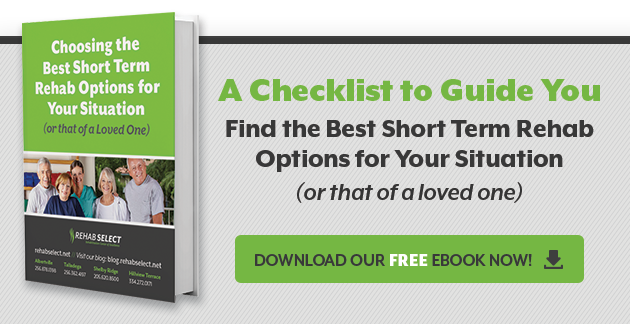 Person-centered care, also commonly referred to as patient-centered or individualized care, is quickly becoming the standard of care throughout our healthcare system, and short term rehab is no exception to that rule. In fact, inpatient short term rehab services providers have been, in many cases, on the cutting edge of this trend since the primary focus of these programs—to aid patients in achieving their own, individual, best level of health, well-being, ability and independence in their daily lives—clearly lends itself to a person-centered approach and atmosphere.
Person-centered care, also commonly referred to as patient-centered or individualized care, is quickly becoming the standard of care throughout our healthcare system, and short term rehab is no exception to that rule. In fact, inpatient short term rehab services providers have been, in many cases, on the cutting edge of this trend since the primary focus of these programs—to aid patients in achieving their own, individual, best level of health, well-being, ability and independence in their daily lives—clearly lends itself to a person-centered approach and atmosphere.
So what does person-centered care mean, exactly? While there is no hard-and-fast definition of the term, the basic principle is that quality care means working cooperatively with all stakeholders—including patients, families and all involved healthcare providers—to provide efficient, supportive and responsive care tailored to the individual needs of each patient. So what are the advantages, in terms of quality of care, of this more holistic approach?
-
Increased patient engagement: One of the most important aspects of person-centered care is that it acknowledges what has been well-known in the short term rehab setting for decades: that best results are achieved when patients are a central participant in their own care. Delivering care with that important concept in mind means placing a greater emphasis on communication with and education of patients and/or families, giving them the information and insight they need to be thoroughly engaged in the care process. People who are engaged in their own care tend to have higher levels of compliance with that care and are more likely to adhere to medication schedules, recommended lifestyle changes and other aspects of care that depend largely on personal choice and motivation levels.
-
Improved patient experience: People who feel as if their individual needs, concerns and values are taken seriously and accommodated by their healthcare providers typically report a better overall patient experience, feeling confident in and satisfied with the care they have received.
-
Improved experience for healthcare providers: The experience of healthcare providers is also improved by person-centered care, increasing their level of confidence in and satisfaction with the overall level of care provided to their patients.
-
Improved care coordination and care transitions: The holistic focus inherent in person-centered care requires effective communication between all healthcare providers throughout the continuum of care, which leads to more efficient care coordination overall and more efficient transitions as responsibility for care is passed from one setting to another: From acute care to short term rehab, for instance. Better coordination leads to more efficient care, eliminating redundancies, such as repetitive testing and/or patient evaluations, for example, and ensuring that important information travels with the patient from one care setting to another. This works to improve quality of care, and in many cases, reduce costs as well.
As person-centered care has become more common throughout the healthcare system, it is clear that the factors outlined above work together to convey one of the chief advantages of person-centered care. By empowering patients in their own care, working to meet their individual physical, social and emotional needs, and providing more efficient care and follow-up, person-centered care promotes improved patient outcomes—which is, of course, the chief objective in any healthcare setting.





